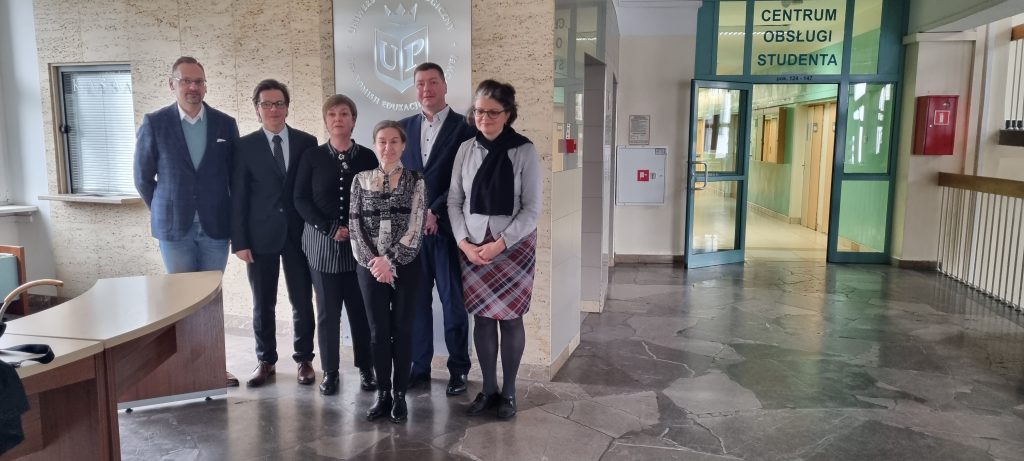Study visit with seminars at the Pedagogical University of Krakow in Poland

In the photo from the left (appearing from the left side): dr. Paweł Walawender (project manager), dr. Mateusz Szast (Polish desk research co-author), dr. Csilla Csukonyi (visitor from Hungary, contracted researcher), dr. Aldona Guzik (Polish desk research co-author), dr. Damian Liszka (project manager deputy), prof. dr. Judit Molnárné Kovács (visitor from Hungary, head of the Hungarian team)
We are pleased to inform that the Polish and the Hungarian teams of scientists participated in a study visit with methodological seminars in the project entitled “The fate of young Ukrainians on the labor market in Central Europe”, scheduled from 17 to 22th February, 2023.
The 1. seminar was dedicated to the question recommendations for labor market institutions activating Ukrainian refugees. Four talks were presented. After every presentations intense discussion part took place. The seminar offered a good opportunity for comparison of policies and experiences from the two countries. The desk research means a good set of background information that supports the interpretation of empirical findings.
Seminar 2 was dedicated to the characteristics of the individual working potential of refugees in the context of the needs of the Polish labor market.
Next working day the Polish and the Hungarian participants worked on their own and prepared materials for the next-day meeting.
During Seminar 3 there were presentations on the topic of labor market in Poland and Ukraine., work patterns, attitudes toward education, lifestyles and plans of the young unemployed Ukrainian refugees, and were introduced the main points of the qualitative tool. The interview questions were presented and potential extensions of the list of questions were discussed. This session was also participated online by the Hungarian project participants not present in Krakow (Szandra Román and dr. Karolina Kovács).
After fixing the details of the qualitative tool prof. Kovács reported about the work of the Hungarian team from the day before. An article structure was presented with the main message that cultural adaptation of immigrants, especially integration, differs by countries, also by PTSD and the interaction of these two. We shared our suggestion for the journal to present the psychological paper and the suggestion was embraced.
Finally, an innovative research project was presented, the IT tool supporting the process of diagnosis, prognosis and tracking the dynamics of changes in neurological patients, with a potential for use in case of patients from Ukraine.
The whole meeting was very useful, an indispensable occasion for efficient idea exchanges, and the work climate was very cooperative and friendly (post based on the report by prof. dr. Judit Molnárné Kovács and dr. Csilla Csukonyi)
 The Fate
The Fate
